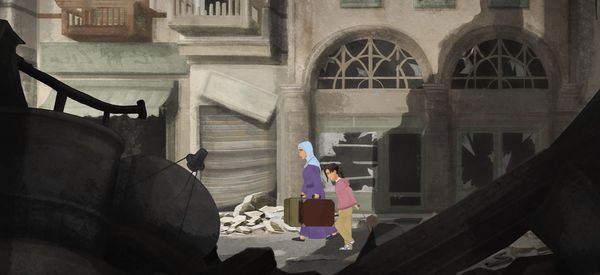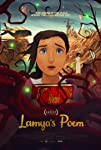Eye For Film >> Movies >> Lamya's Poem (2021) Film Review
Lamya's Poem
Reviewed by: Jennie Kermode

“We live two lives,” the poet’s father tells him. “One in the present and one in a timeless world.”
The poet is, of course, Jalāl ad-Dīn Mohammad Rūmī, and he lives here within the imagination of Lamya, a 12-year-old girl, who in turn lives with her mother in modern Aleppo. She has sought him out after receiving a volume of his poems from a schoolteacher who is determined that she should continue to receive an education despite the disruption caused by the civil war. As the situation becomes more and more dangerous, she is faced with the prospect of a long and dangerous journey to seek sanctuary overseas, which leads her to relate to Rumi’s flight from Mongol invaders all those centuries ago.
Simple but evocative animation links these two worlds, together with the suggestion that Rumi was himself imagining future readers, and how his words might help them, when he continued to write through the most difficult years of his life. Do they share this conjectured space? Despite the turmoil in her life, Lamya continues to read and to discover the power of stories, which she will share with others. She helps Rumi to write his poem and he, in turn, helps to maintain her faith in civilisation and love.
The characters here may be simple in outline but they have an impressive subtlety of expression. The use of animation (and the English dialogue, which isn’t great and at its worst makes this feel like a Saturday morning cartoon) combine to create a film which is very accessible to Western audiences, helping to create empathy with the people of Syria and to communicate social, historical and cultural details with which they might not be familiar. You don’t need much knowledge of the poet’s work to engage with the story, nor to appreciate the different kinds of love it addresses, from that intellectual connection across time to Lamya’s feelings for her mother, her mother’s longing for her interred and probably murdered husband, and the different kind of longing present in a local boy who keeps trying to impress Lamya but only succeeds in annoying her. Above all these, of course, is love of the written word itself.
Screened as part of the Vancouver International Film Festival, Lamya’s poem balances an awareness of the lasting human potential for violence with a celebration of resistance and of striving toward higher things. It’s a reminder of the capacity of civilised values to endure even when civilisation itself is lost. It also emphasises just how much potential might be lost each time a refugee family climbs aboard a raft.
Reviewed on: 10 Oct 2021















